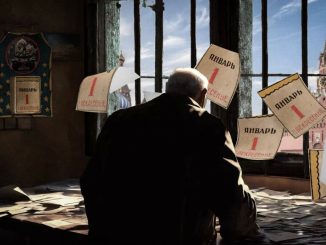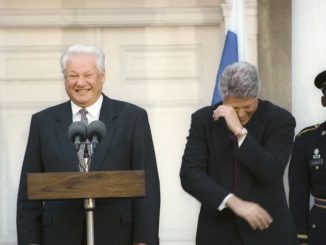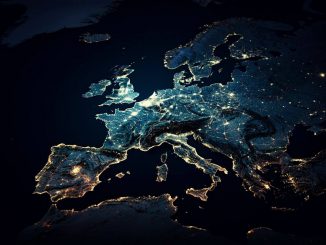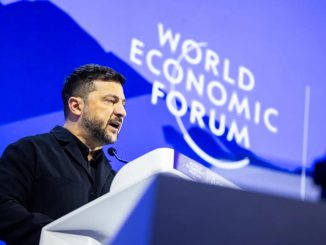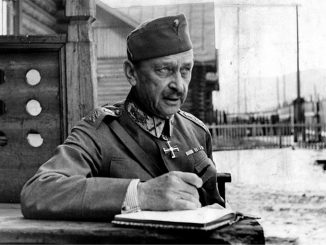In the early 1980s, Russia was preparing for military intervention in Poland. For the Kremlin, there was no question of repeating the Prague coup of 1968 or the tank interventions in Budapest in 1956 and Berlin in 1953. It was necessary to ‘play it soft’, which is still not a Russian speciality! Department A of the KGB then launched a gigantic disinformation campaign to make us believe the opposite of what the Soviet project was actually about…

Introduction: ‘A snake sheds its skin, but it does not change its nature’
Defence Minister André Giraud had a very difficult time setting up a specialised observatory. In the end, he had to give up. This is how the Institut d’Études de la Désinformation (Institute for the Study of Disinformation) was born. Eighty French and foreign journalists decided to track down disinformation, which at the time earned them the label of ‘far right’! For the left, Russia was not a threat, and for the far left, it remained the beacon that illuminated the workers! At the time, Valeurs Actuelles denounced the Soviet threat, while Le Monde Diplomatique saw us as ‘zealous informers who would have done wonders under the occupation’. This led to the editor of Le Monde Diplomatique, Claude Julien, being convicted as a ‘KGB agent’ and the editor of Le Monde, André Fontaine, as an ‘accomplice’. The appeal verdict was even harsher than the first.[*]
Today, it is Le Monde that is leading the way. Most left-wing journalists condemn the Russian invasion of Ukraine, while many right-wing journalists see Vladimir Putin as a role model! O tempora… Fortunately, there are always exceptions to prove the rule.
You only have to read Françoise Thom‘s articles on this website since the 2000s to realise that those who wanted to know could know. Putin has never hidden his objectives, just like Hitler. There were those in the 1930s who let their guard down when the threat was very real, and those who claimed in the years 1985-2017 to be ‘reaping the dividends of peace’ (you had to think of that one)! Blindness for some, wishful thinking for others, even treason for the latter who found sources of unspeakable profit there.
In this chorus of the 1980s, Mitterrand’s voice caused a scandal (on the left) when he stated, with a courage and lucidity rare in a politician, this fundamental truth: ‘pacifism is in the West, and Euromissiles are in the East’!
It is far too early to assess Emmanuel Macron’s actions, but in at least two respects he will one day earn respect for having broken the spiral that, year after year, reduced our military budgets to the point where all that remained was the strike force that General de Gaulle fortunately left us and which no one dared touch. It must be said that without this force and without the seat at the UN that the general obtained for us with Churchill’s help, the voice of a French president would not carry much weight in the world.
Today, we are finally ‘naming’ the adversary, even the enemy… What a break with the past after so many years! The two statements by Nicolas Lerner on LCI and by General Thierry Burkhard show that ‘something is changing’. A three-step media waltz that Céline Berthon, Director General of Internal Security (DGSI), had started in the programme C dans l’air on France 5 on 15 June 2025.
Malicious tongues will say that the heads of major foreign services intervene when the situation demands it and that France has finally understood that the message is probably better received when it comes from operational staff than from politicians! Let’s hope it’s not too late to prepare ourselves for a new war where, as usual, we knew everything in advance and did nothing![**]
Joël-François Dumont
This week’s European Security editorial is devoted to this moment of ‘strategic clarity’ in an era of confrontation that is becoming clearer every day, in the hope that it will not come to pass. Is Europe at a turning point in its history? There is a feeling of being ‘abandoned’ after 80 years of a transatlantic relationship that had guaranteed peace and prosperity for our continent by sparing us from global conflicts. The public statements by the DGSE and the CEMA in France and their media coverage show that something is changing, that the end of recess has finally been signalled.
Table of Contents
I) A Coordinated Shift in French Strategic Communication
A series of exceptional media events marked the French strategic landscape in July 2025. Within a few days, the Director-General of the Directorate-General for External Security (DGSE), Nicolas Lerner, gave a televised interview to the LCI channel—only the second such occurrence in forty years for a serving head of the agency—followed closely by a rare and extensive press conference by Army General Thierry Burkhard, Chief of the Defence Staff (CEMA).[01][02] Far from being a coincidence, this sequence appears to be a meticulously orchestrated strategic communication campaign.[02]
These interventions signal a fundamental change in French state policy, moving away from the traditional culture of secrecy of “la Grande Muette” (the Great Mute) to adopt a new doctrine of “strategic legibility.”[03]
The objective is threefold: to prepare and inoculate French society against hybrid threats, to send a clear message of deterrence to adversaries, and to signify France’s resolve and strategic direction to its allies.
These statements are set against a global backdrop that General Burkhard describes as a “tipping point”,[02][04] characterized by an uninhibited use of force and a “ratchet effect” of overlapping crises that preclude any return to the past.[02]
Ultimately, the interventions of Nicolas Lerner and Thierry Burkhard represent a unified and deliberate effort by the French security apparatus to articulate a new, more confrontational strategic reality, primarily driven by the “existential threat” posed by Russia, and to publicly align the postures of intelligence and the armed forces in response to this reality.
II) Intelligence Doctrine Unveiled: Deconstructing Nicolas Lerner’s Interview (LCI, July 8, 2025)

2.1 The End of the “Great Mute”: The Political Significance of a Public-Facing DGSE
Nicolas Lerner’s interview constitutes a cultural and institutional rupture. The DGSE, historically nicknamed “la Piscine” (the Swimming Pool) in reference to its headquarters on Boulevard Mortier, has always cultivated secrecy. This appearance is perceived by media outlets like the Moroccan site le 1.ma as a strong political act, a signal that “the house is standing,” rearmed and refocused under the impetus of President Emmanuel Macron.[03] It is about showing an agency that has overcome its past difficulties and is now in full command of its capabilities.
This new posture illustrates an awareness: in a world where the information space has become a full-fledged theater of confrontation, communication is no longer just an exercise in transparency, but a weapon of counter-influence.[03] By speaking publicly, for example to refute the allegations of Telegram founder Pavel Durov, the DGSE seeks to regain control of the narrative and counter destabilization campaigns.[03] This paradigm shift is supported by a massive strengthening of the agency’s capabilities. Since 2017, the DGSE has increased its staff by 1,100 agents, with another 500 hires planned, and benefits from a substantial increase in its budget, notably to finance its colossal move to the Fort Neuf de Vincennes by 2030-2031.[03][05][06][07] This material power gives tangible weight to its director’s words.
2.2 Russia: Anatomy of an “Existential Threat”
Nicolas Lerner’s central message, echoed by all media, is that Russia constitutes an “existential threat in the medium and long term for Europe, for our democracies, for our values.”[08][09][10] This is no longer a simple strategic competition, but a conflict of systems.

The head of the DGSE deconstructs the Kremlin’s doctrine, identifying two fundamental pillars: a defensive “paranoia” in the face of the rise of democracies on its borders and a “nostalgia for the Russian empire.”[03][09] He asserts that Russia is “ideologically preparing a possible military intervention” against NATO, making an asymmetric attack on a Baltic state a “hypothesis to be taken very seriously.”[08]
This analysis marks a significant hardening of the French position. The Russian threat is no longer just a problem to be managed but an existential danger to be confronted. This change in perspective not only justifies the increase in resources allocated to intelligence but also aligns its diagnosis with that of the military, which is preparing for “high-intensity” conflicts. Lerner also details the evolution of the hybrid war waged by Moscow.

Before the 2022 invasion of Ukraine, about 80 Russian agents were active in France, 50 of whom have since been expelled.[03][10] Today, the Kremlin increasingly operates through “proxies” and “disposable agents” [11] —local intermediaries paid to carry out clandestine actions and physical sabotage operations, such as the incident of coffins placed near the Eiffel Tower.[10] Lerner insists that these are not amateur operations, but sophisticated actions aimed at “undermining trust in our institutions.”,[08][10] This point particularly caught the attention of the international specialized press like The Record.[10]
2.3 The Global Chessboard: Iran, Strategic Diplomacy, and European Autonomy
On the Iranian nuclear issue, Nicolas Lerner provides an assessment marked by the characteristic caution of intelligence. He confirms that recent US-Israeli strikes have “seriously damaged” the program and set it back by “several months.”[12][13][14] However, he immediately tempers this observation by highlighting a major uncertainty: the location of the bulk of the highly enriched uranium stock remains unknown due to the blocking of access for IAEA inspectors.[12][15] He emphasizes that “no intelligence service in the world” can claim a perfect and complete assessment of the situation,[09][14] a message that was the main angle for Israeli media and some American outlets.[12][13][15]

At the same time, the DGSE director outlines a doctrine of “permanent channels,” stating that his agency maintains dialogue with “almost all security services in the world,” including those of adversary countries like Russia or Algeria.[03] This “intelligence diplomacy” is presented as a crucial state tool that endures when formal diplomatic relations are at a low point. It is particularly vital in the fight against terrorism, an area where cooperation remains an almost universal constant.[03][09] Finally, a common thread in his intervention is the call for greater European strategic autonomy. Noting that the United States, under the Trump administration, is refocusing on its domestic priorities, Lerner asserts that Europe must “learn to ‘do more'” in the field of intelligence, just as it must in defense.[03][09] He thus explicitly links the strengthening of the DGSE to the French doctrine of European strategic autonomy.
2.4 Behind the Scenes at “the Pool”: The Ethos and Methods of Modern French Espionage
Moving beyond James Bond stereotypes 16, Nicolas Lerner sketches the portrait of a DGSE agent. He describes them as needing to be “clever, curious, manipulative, cautious.”[03] He also mentions the four classic motivations that can lead to betrayal, summarized by the Anglo-Saxon “4Ms”: Money, Morality (or lack thereof), Mesmer (ideology or ego), and Motive (personal motive).[03]

While acknowledging the power of technological tools and artificial intelligence, he insists on their supporting role: they are there to “help sort,” not to replace human analysis. He warns against infobesity—”too much data kills information”—thus reaffirming the primacy of the human mind and the operational humility of the service.[03] Finally, addressing fears of a “deep state,” Lerner is keen to present the DGSE as a service that is not out of control. He emphasizes that its actions are strictly framed by law, subject to political control and the oversight of independent authorities, a message clearly intended to reassure a domestic public wary of potential abuses by intelligence services.[03][09]
III) The Military Diagnosis: General Burkhard’s Strategic Vision (Press Conference, July 11, 2025)
3.1 The New Threat Paradigm: “What is Most Dangerous Becomes Most Probable”
General Burkhard’s most striking statement, which encapsulates his thinking, is a true change in doctrine: “What is most dangerous is also what becomes most probable.”[17][18] This formula overturns the traditional risk matrix that classified threats by their probability and impact. It means that the French armed forces are now actively preparing for a high-intensity conflict not as a distant possibility, but as a plausible scenario.

This evolution is the consequence of what the CEMA calls a “ratchet effect”: a world of multiple, overlapping crises [02] where no return is possible. He points to a “habituation to violence,” illustrated by the fact that an attack of 300 missiles by one state against another can be considered “not very serious” on the pretext that most were intercepted.[17] This normalization of extreme acts redefines the strategic environment. The general then provides a comprehensive overview of threats across all domains and environments: sabotage of submarine cables, militarization of space with hostile maneuvers by Russian satellites, massive cyberattacks, and pervasive information warfare.[04][17][19][20]
3.2 France in the Crosshairs: Russia’s “Main Adversary” in Europe
General Burkhard’s central assertion, widely reported, is that the Kremlin “has made France one of its priority targets” and designated it as its “main adversary in Europe.”[01][02][11][19][20][21] This hostility is directly linked, according to him, to Paris’s support for Ukraine.

In this confrontation, the CEMA explicitly identifies “national cohesion” as a strategic center of gravity that adversaries seek to attack by all means.[17] He directly links this concept to disinformation campaigns (such as the bedbug affair or the tagged Stars of David) 11 and the weaponization of migration flows.[17] In doing so, he provides the military justification for the societal resilience effort that the DGSE’s communication aims to build. For General Burkhard, the stake in Ukraine is absolute: a Russian victory would be a “European defeat” [04] [19] and Vladimir Putin’s ultimate goal is to “weaken Europe and dismantle NATO.”19
Supporting Kyiv is therefore not a choice, but a strategic necessity for the very security of France.
3.3 Adaptation of the French Armed Forces: Doctrine, Posture, and Presence
The concrete military consequence of this new paradigm is the pivot towards preparing for “high-intensity warfare.”[18] General Burkhard insists that this preparation is the best way to deter such a conflict from occurring. This orientation is perfectly aligned with the budgetary and capability reforms undertaken within the framework of the 2024-2030 Military Programming Law (LPM).[06][22]

The French Chief of Staff (CEMA) also provided a frank and unprecedented explanation for the change in posture in Africa. He argued that the traditional model of permanent military bases had become a handicap, a symbol of contested sovereignty that generated “more disadvantages than advantages” in the current context.[17]
This analysis marks a major evolution in French strategic thinking about its role on the continent.
Finally, while Russia is the main adversary, General Burkhard does not overlook other competitors. He identifies China as a “global and structuring competitor” engaged in economic and informational competition (for example, by seeking to discredit the Rafale fighter jet) [11][17] and Iran as a regional power with global ambitions that practices “state terrorism.”.[17][18]
The convergence of the diagnoses of the head of the “DGSE” and the “CEMA” is so complete that it constitutes a true “French doctrine of confrontation,” presented publicly for the first time.
Whether concerning the nature of the Russian threat (“existential” for Nicolas Lerner, “the most significant” for Burkhard), its methods (proxies and disinformation), or the strategic stakes (European autonomy and the centrality of Ukraine), the messages are identical in substance. Such alignment is not coincidental; it is the result of a coordinated decision at the highest level of the state to present a single, coherent vision of the threat, thereby shaping the political and social conditions necessary for a more robust and costly defense posture.
IV) The Media Echo: French and International Receptions
4.1 The View from France: Between Pedagogy and Alarm
In France, media coverage of these interventions occurred at two speeds. Specialized defense media, such as OpexNews or Armees.com, focused on the strategic and doctrinal substance. They highlighted the convergence of the two speeches,[08] the paradigm shift embodied by the phrase “the most dangerous becomes the most probable”,[18] and the technical details of the threats. Their tone was analytical, addressing an already informed audience.
Conversely, generalist media (LCI, BFMTV, Public Sénat) amplified the most striking and anxiety-inducing statements: “Russia’s main adversary”,[02][21] “existential threat”,[08] “coffins at the Eiffel Tower.”[10] Their coverage, visible in headlines and video clips,[19] aimed to raise public awareness, sometimes adopting a more sensationalist tone focused on the sense of immediate danger. The sources available for this analysis do not report specific reactions from French political opposition figures, such as Marine Le Pen or Jean-Luc Mélenchon, to these precise interventions in July 2025.[23]
4.2 The International Prism: Geopolitical Interests Shape the Narrative
Internationally, the reception of the French messages was filtered and reinterpreted through the prism of each region’s interests and security concerns.
| Country/Region | Key Media | Main Thematic Focus | Dominant Tone | Key Quote/Idea | Identifiers |
| Israel | The Jerusalem Post, The Times of Israel | The Iranian nuclear program. Almost exclusive focus on Lerner’s assessment of damage to Iranian facilities and uncertainty about the uranium stock. | Factual, concerned, analytical. | “Uncertain of the location of the rest of Iran’s highly enriched uranium.” | [12][13][15] |
| USA / UK | The Record, AP News, RFI English Service, Defense One | The escalation of Russia’s hybrid war against Europe/NATO. Framing of French warnings in the context of a continent-wide Russian sabotage campaign. | Alarmed, urgent, focused on collective defense. | “French intel chief warns of evolving Russian hybrid operations, an ‘existential threat’ to Europe.” | [10][11][20][24][25] |
| Morocco | le1.ma | The political and strategic maneuver of the French state. In-depth analysis of the interview as a calculated act of power, communication, and strategic repositioning. | Sophisticated, analytical, interpretive. | “This interview marks… a methodical evolution: the will to assume a form of strategic legibility.” | [03] |
| Turkey | Anadolu Agency | The broad spectrum of threats and the call for European defense. Reporting on Burkhard’s warnings about Russia as a “lasting threat” and the need to strengthen European defense capabilities. | Informative, geopolitical. | “French army chief warns of a ‘lasting’ Russian threat and calls for stronger European defense.” | [01][11] |
This fragmentation of reception is revealing. The Anglo-American press, like The Record [10] or AP News,[24] immediately integrated Lerner’s remarks into a broader, alarming narrative of a Russian sabotage campaign across Europe, citing incidents in Poland, the Netherlands, and the United Kingdom. This reflects the main concern of the NATO core. Conversely, the Israeli press almost entirely ignored the Russian dimension to focus exclusively on statements related to the Iranian nuclear program,[12][13][15] demonstrating a filtering of information based on its national security priorities. The Moroccan media outlet le1.ma offered the most holistic analysis, seeing the event not only as a warning but also as a complex political maneuver by the French state to reassert its power and strategic clarity.[03] This perspective reflects the viewpoint of a key partner in a region where French influence is contested. Thus, although France is trying to project a universal doctrine of strategic clarity, its message is inevitably broken down and reinterpreted by its recipients.
V) Conclusion: The Doctrine of Lucidity and the Path Forward
The successive interventions of Nicolas Lerner and Thierry Burkhard have crystallized a tipping point. The French state, through the voices of its intelligence and military chiefs, has publicly articulated a unique, coherent, and unvarnished diagnosis of the global security environment. The era of ambiguity is over; the age of confrontation has been formally declared.
This new “doctrine of lucidity” has both advantages and risks. On one hand, it can strengthen public awareness and resilience against disinformation, send clearer deterrent signals to adversaries, and increase France’s credibility and leadership in Europe. On the other, it risks increasing public anxiety, locking France into a confrontational posture with little room for de-escalation, and exposing the country to a loss of credibility if strong words are not followed by actions and investments to match.
A major variable hangs over this entire strategy: the American factor. The French push for European strategic autonomy [03][11] is insurance against a possible American disengagement. The success of this new French posture will largely depend on the future of the transatlantic relationship and Europe’s real capacity to “do more.” Ultimately, these interventions marked a turning point. They publicly revealed a France that sees itself as a priority target in a new era of global competition and is fundamentally retooling its security apparatus and collective mindset for a struggle that promises to be long. The path forward will require translating this strategic clarity into sustained political will, industrial capacity, and societal resolve.
European-Security
[*] Claude Julien was convicted as a ‘KGB agent’ by a first instance judgment handed down by the Paris District Court on 6 May 1988, which was upheld by the Paris Court of Appeal at its hearing on 21 September 1988. The first journalist convicted of spying for the Soviet Union in France, following an investigation by the DST, was Charles Pathé. ‘On 23 May 1980, the State Security Court sentenced Pierre-Charles Pathé to five years’ imprisonment for having provided political analyses and summary reports to agents of a foreign power for some twenty years. Pierre-Charles Pathé was released from prison at the end of June 1981, after being pardoned.’ (Source: DCRI). The journalists who served Moscow in exchange for payment have in common that, apart from Pathé, they never went to prison and all died in their beds! The last ones to be updated suddenly disappeared from the media world…
[**] See « Bon-Encontre : le chemin de l’honneur et de la Résistance » Speech by Air Force General François Mermet at the AASSDN congress — (2021-1011)
See Also:
- « Russia: An Existential Threat to Europe » — (2025-0712) —
- « Rußland: Existenzielle Bedrohung für Europa » — (2025-0712) —
- « La Russie : une « menace existentielle » pour l’Europe » — (2025-0712) —
- « Росія: екзистенційна загроза для Європи » — (2025-0712) —
Notes
- [01] Burkhard : “Le Kremlin a fait de la France une de ses cibles prioritaires” | Anadolu Ajansı, (July 12, 2025),
- [02] « Le Kremlin a fait de la France une de ses cibles prioritaires »… | (July 12, 2025),
- [03] « La DGSE se relève et parle » | le 1.ma (July 12, 2025),
- [04] Thierry Burkhard, chef d’état-major des armées : « La défaite de l’Ukraine serait une défaite européenne » | Yahoo, (July 12, 2025),
- [05] Assemblée Nationale « Tome II – Défense : Environnement et prospective de la politique de défense » | (July 12, 2025),
- [06] Sénat : Renseignement et prospective : garder un temps d’avance, conserver une industrie de défense solide et innovante | Sénat, (July 12, 2025),
- [07] « DGSE, quel est l’impact des services de renseignement ? » | YouTube, (July 12, 2025),
- [08] « Nicolas Lerner (DGSE) : la Russie prépare une intervention militaire » | (July 12, 2025),
- [09] « Exclusif : Pour la 1ere fois le patron de la DGSE ouvre les portes de l’institution à une télévision » | YouTube, (July 12, 2025),
- [10] « French intel chief warns of evolving Russian hybrid operations » … | (July 12, 2025),,
- [11] « French army chief warns of ‘lasting’ Russian threat, urges stronger European defense » | (July 12, 2025),
- [12] « French Intelligence: Iran’s Uranium Stockpile Location Unknown » | Kurdistan 24, (July 12, 2025),
- [13] « French intelligence chief said some of Iran’s uranium destroyed » | The Jerusalem Post, (July 12, 2025),
- [14] « Selon la DGSE, le programme nucléaire iranien a beaucoup de retard » | Armées.com, (July 12, 2025),
- [15] « French spy chief: Uncertain where Iran’s remaining highly enriched uranium is located » | (July 12, 2025),
- [16] « La communication au secret : comment la DGSE a remodelé son image publique » | (July 12, 2025),
- [17] « Menace russe, nucléaire, terrorisme »… La conférence de presse du chef d’état-major des armées | YouTube, (July 12, 2025),
- [18] « Le général Thierry Burkhard alerte sur la Russie, la Chine et l’Iran » | Opex News (July 12, 2025),
- [19] Thierry Burkhard, chef d’état-major des armées : « La défaite de l’Ukraine serait une défaite européenne » | Vidéo Dailymotion, (July 12, 2025),
- [20] « Russia sees France as its ‘chief enemy’ in Europe, says head of French army | Yahoo, (July 12, 2025),
- [21] « La Russie juge “la France comme son principal adversaire en Europe » (chef d’état-major) | (July 12, 2025),
- [22] « Projet annuel de performances Défense » | (July 12, 2025),
- [23] « What are the implications of Marine Le Pen’s fraud conviction? » | Inside Story – YouTube, (July 12, 2025), & AP News, (July 12, 2025),
- [24] The D Brief: Houthis sink second ship; « UK-France nuke deal; Russia’s drone factories; 3 Marine bases get ICE agents; And a bit more » | Defense One, (July 12, 2025),
- [25] « Ce qui est le plus dangereux est aussi ce qui devient le plus probable » : la mise en garde du chef d’état-major des Armées | Opex News (11 juillet 2025).



